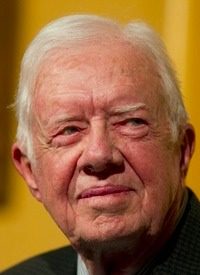
Carter recently told CNN religion writer Eric Marrapodi that he has been teaching Sunday School since he was an 18-year-old Navy midshipman, and has taught the adult class at Maranatha Baptist Church in his hometown of Plains, Georgia nearly 700 times since returning home after leaving the White House in 1980.
The notes in the Zondervan-published NIV Lessons from Life Bible: Personal Reflections with Jimmy Carter are pulled from Carter’s 70-plus years of study, preparation, and delivery of scriptural precepts as a Bible instructor, and include such wisdom as this observation on the passage in Mark’s Gospel in which Christ’s disciples are arguing over who is the greatest. “Like the disciples, we should not be proud, seek an ascendant position or argue about who’s the greatest among us,” writes the former President.
Similarly, in his interview with Raushenbush Carter offers this inspiring and biblical observation on Christian behavior: “The example that I set in my private life is to emulate what Christ did as he faced people who were despised like the lepers or the Samaritans. He reached out to them, he reached out to poor people, he reached out to people that were not Jews and treated them equally. The more despised and the more in need they were, the more he emphasized that we should go to and share with them our talent, our ability, our wealth, our influence.”
But as Raushenbush’s interview also reveals, Carter’s take on such issues as divine inspiration of Scripture, the exclusivity of the Christian faith, and the acceptability of homosexuality will leave some conservative evangelicals doubtful about the former President’s understanding of biblical Christianity.
For example, Carter seems to cast doubt on the absolute truth of Scripture when he tells Raushenbush: “When we go to the Bible we should keep in mind that the basic principles of the Bible are taught by God, but written down by human beings deprived of modern day knowledge. So there is some fallibility in the writings of the Bible.”
Asked if Christ’s claim to be “the way the truth and the life” (John 14:16) disqualifies other faith traditions as paths to God, Carter takes it as an opportunity to denigrate conservative evangelicals such as the Southern Baptist denomination he left a few years ago over theological differences. “There are many verses in the Bible that you could interpret very rigidly and that makes you ultimately into a fundamentalist,” Carter responded. “When you think you are better than anybody else — that you are closer to God than other people, and therefore they are inferior to you and subhuman — that leads to conflict and hatred and dissonance among people when we should be working for peace.”
As for Christ’s declaration that He, the Prince of Peace, ultimately “did not come to bring peace but a sword” to earth (Matthew 10:34), Carter apparently missed the implication that Christ’s call for men and women to follow the way of the Cross would cause them, like Him, to be despised and rejected by the world. Instead, he interprets that clear call to absolute devotion to Christ to mean nothing more than “that when we have conflict in our mind or hearts, between our secular duties and teachings of Christ, we should put the teachings of Christ first.”
Perhaps most troubling, however, is Carter’s rejection of the clear biblical condemnation of homosexuality, telling Raushenbush that homosexuality “was well known in the ancient world, well before Christ was born, and Jesus never said a word about homosexuality.” Ignoring both Old and New Testament condemnation of the act, as well as the mercy God has for those who turn away from sin, Carter declared that “I personally think it is very fine for gay people to be married in civil ceremonies.”
In 2010 LifeSiteNews.com noted that Jimmy Carter speculated that with the election of Barack Obama as the nation’s first black President, it was just a matter of time before Americans would lay aside their negative prejudice and elect a “gay” President as the next step in the country's march toward civil rights. “Step-by-step, we have realized that this issue of homosexuality has the same adverse and progressive elements as when we dealt with the race issue 50 years ago, or 40 years ago,” Carter said in an interview published on the website Big Think. “So I would say that the country is getting acclimated to a president who might be female, who might, obviously, now, be black, and who might be as well a gay person.”
LifeSiteNews noted that in spite of his evangelical Baptist roots, “Carter has established himself as a firm supporter of the gay agenda. In 2007 the former president urged the U.S. military to repeal the ban on open homosexuals in the service.”
Photo of former President Jimmy Carter: AP Images

